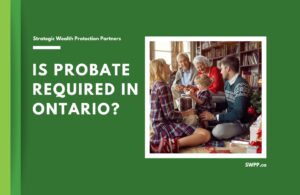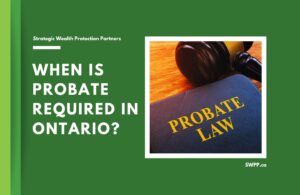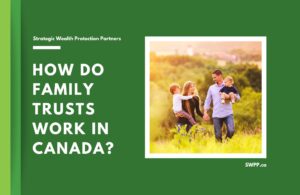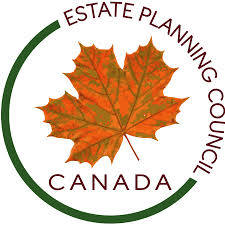Written by Ron Cooke, President & Founder of Strategic Wealth Protection Partners in Ontario, CEA®, Member of the Estate Planning Council Canada
In Ontario, there is no inheritance tax, meaning beneficiaries don’t pay tax on what they receive. However, the estate may still owe taxes.
First, there’s the estate administration tax, which is a probate fee based on the value of assets that require probate. The first $50,000 is exempt, and anything above is taxed at 1.5%.
Second, and more importantly, when someone dies, they’re considered to have sold all their capital property at fair market value, which is called a deemed disposition. As a result, the estate may owe capital gains tax on things like real estate, cottages, and investments, which is reported on the final income tax return.
While some assets, like RRSPs and life insurance, may avoid probate through named beneficiaries, they can still be taxed as income if not transferred to a spouse. Proper planning can help minimize both probate fees and income taxes, preserving more of your estate for your heirs.
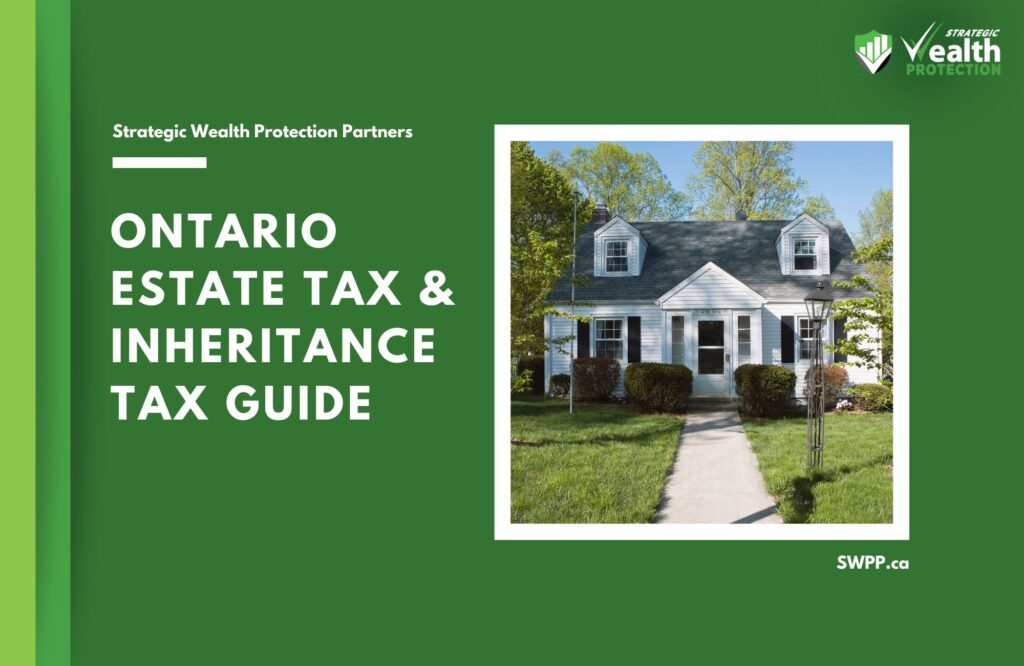
In this Ontario estate tax and inheritance tax guide, I’ll cover the essentials that every resident of Ontario needs to know.
In addition, if you’re a business owner or own multiple properties, there are additional considerations that could significantly impact how much tax your estate pays and how efficiently your assets are transferred.
Planning ahead can help reduce estate administration tax, avoid delays in probate, and ensure your beneficiaries receive the maximum benefit.
Nobody wants to have their family’s wealth diminished by excessive taxation.
So let’s cover how to avoid that.
Key Takeaways
- Ontario doesn’t charge inheritance tax, but estates may still owe capital gains and probate taxes.
- The deemed disposition rule in Canada is a “death tax” that can severely reduce a family’s generational wealth.
- Life insurance can be used to pay the capital gains taxes on secondary properties and investments, preserving wealth.
- Trusts allow Ontario residents to bypass probate.
Does Ontario Have an Inheritance Tax?
Ontario does not have an inheritance tax, and this often comes as a relief to families.
What this means is that if you are a beneficiary, you do not pay a tax just because you received money, real estate, or other estate assets. Instead, taxes are dealt with inside the deceased’s estate before anything is passed on.
This is an important distinction because while there is no inheritance tax, the estate trustee must still account for probate tax, capital gains, and other obligations before distributing assets.

How Does the Final Tax Return Upon Death Work in Ontario?
When someone passes away, the Canada Revenue Agency requires what is known as a final tax return.
The law treats the person as though they sold all assets owned at fair market value immediately before death. This deemed disposition can trigger large capital gains on investments, mutual funds, or real estate, which means the estate owes tax before anything is passed down to children.
While there is a spousal rollover that allows assets to transfer tax-free to the surviving spouse, the full tax bill often surfaces when the second spouse passes away. This is where generational wealth can erode, especially if families have cottages, large investment portfolios, or real estate holdings.
What Is the Ontario Estate Administration Tax?
The Ontario Estate Administration Tax, commonly known as probate tax, is a fee payable to the province when an estate goes through probate.
The estate trustee must file an estate information return online to report the value of all estate assets.
The first $50,000 of estates valued are exempt, but everything above is subject to a 1.5% fee. For example, on an estate worth $500,000, the estate would pay estate administration tax on $450,000.
Many people confuse this fee with inheritance tax, but they are very different: probate tax is based on the size of the deceased’s estate, not on what each beneficiary receives.
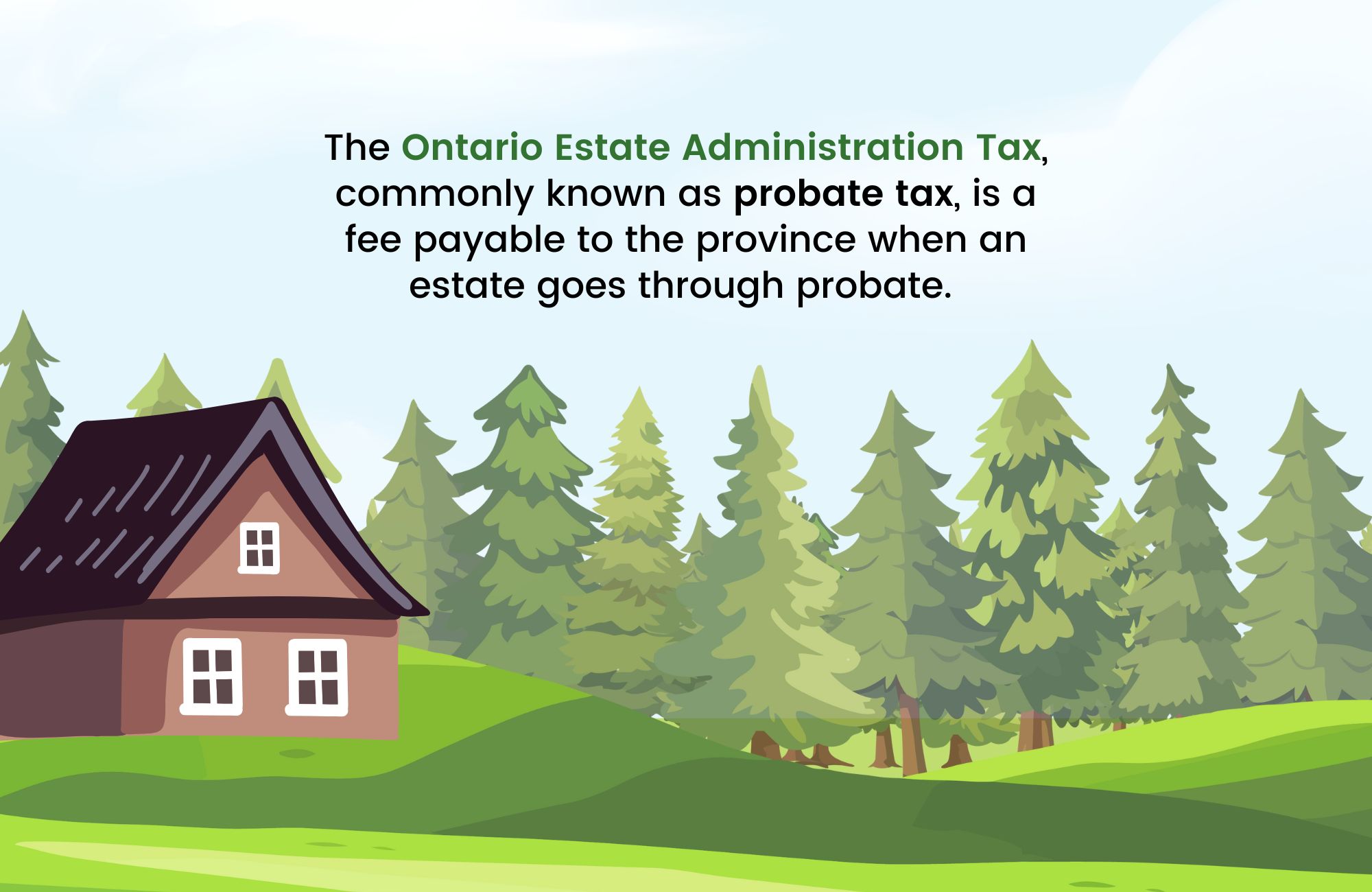
How Can I Calculate Probate in Ontario?
Calculating probate tax is straightforward once you know the value of the deceased’s estate. The first $50,000 is exempt. Anything above that is taxed at 1.5%.
This means that if an estate includes real estate, investment accounts, and bank accounts that require probate, all of these assets must be included in the total value. For example, an estate worth $800,000 would owe probate tax of $11,250.
Ontario Probate Fee Calculator
Which Assets Are Included in the Value of the Estate?
The probate calculation includes assets such as real estate in Ontario held solely by the deceased, investment accounts without a beneficiary designation, and bank accounts in the individual’s name.
Life insurance policies and registered accounts with named beneficiaries usually bypass probate. Accuracy is vital because overvaluing or undervaluing estate assets can result in penalties, delays, or even challenges to the estate.
Remember, probate and the final tax return upon death are different: an asset can bypass probate but still trigger capital gains tax on the final return.
When Is Probate Required?
Probate is generally required when an executor needs court approval to transfer assets.
This often happens with real estate registered only in the deceased’s name or when financial institutions request a probate certificate before releasing funds.
In some cases, probate can be avoided by planning ahead with joint ownership or proper beneficiary designations. Without these measures, the estate trustee may have no choice but to apply for probate.
How Can I Reduce or Avoid Probate Fees?
While probate fees cannot always be eliminated, they can be reduced with planning.
Strategies include holding assets jointly with right of survivorship, using a beneficiary designation on accounts and insurance policies, or gifting assets during your lifetime.
Trusts can also play a role in sheltering assets and reducing the portion of the estate that must go through probate.
Tax Planning for Business Owners in Ontario
Business owners face additional challenges when it comes to estate laws.
Succession planning, shareholder agreements, and the use of holding companies can make a significant difference in tax efficiency.
Life insurance is often used to ensure that business partners or children have the liquidity they need to pay estate administration tax and settle obligations without selling the company. Without proper planning, the estate owes tax that may force the sale of a family business at the wrong time.
Tax Planning for Real Estate Investors
For real estate investors, the final tax return is where challenges arise.
When a person dies, their real estate is deemed disposed of at fair market value, and the estate owes capital gains tax. This can be particularly difficult for investors who hold multiple properties.
Planning solutions include estate freezes, inter vivos trusts (living trusts), and life insurance as a funding mechanism to cover taxes. With the right planning, families can avoid being forced to sell properties simply to pay tax.
How to Keep the Family Cottage in the Family without a Huge Tax Bill
For many families, the cottage is the heart of their legacy.
The challenge is that cottages often have large unrealized capital gains. Since only one property qualifies for the principal residence exemption, the cottage is usually taxable when passed to children.
One way to protect the cottage is to use permanent life insurance to provide a tax-free payout that covers the capital gains. Another option is to create a trust that sets aside funds for maintenance, taxes, and succession so the cottage can remain in the family for future generations.
Read More: How to Avoid Capital Gains on a Cottage in Ontario
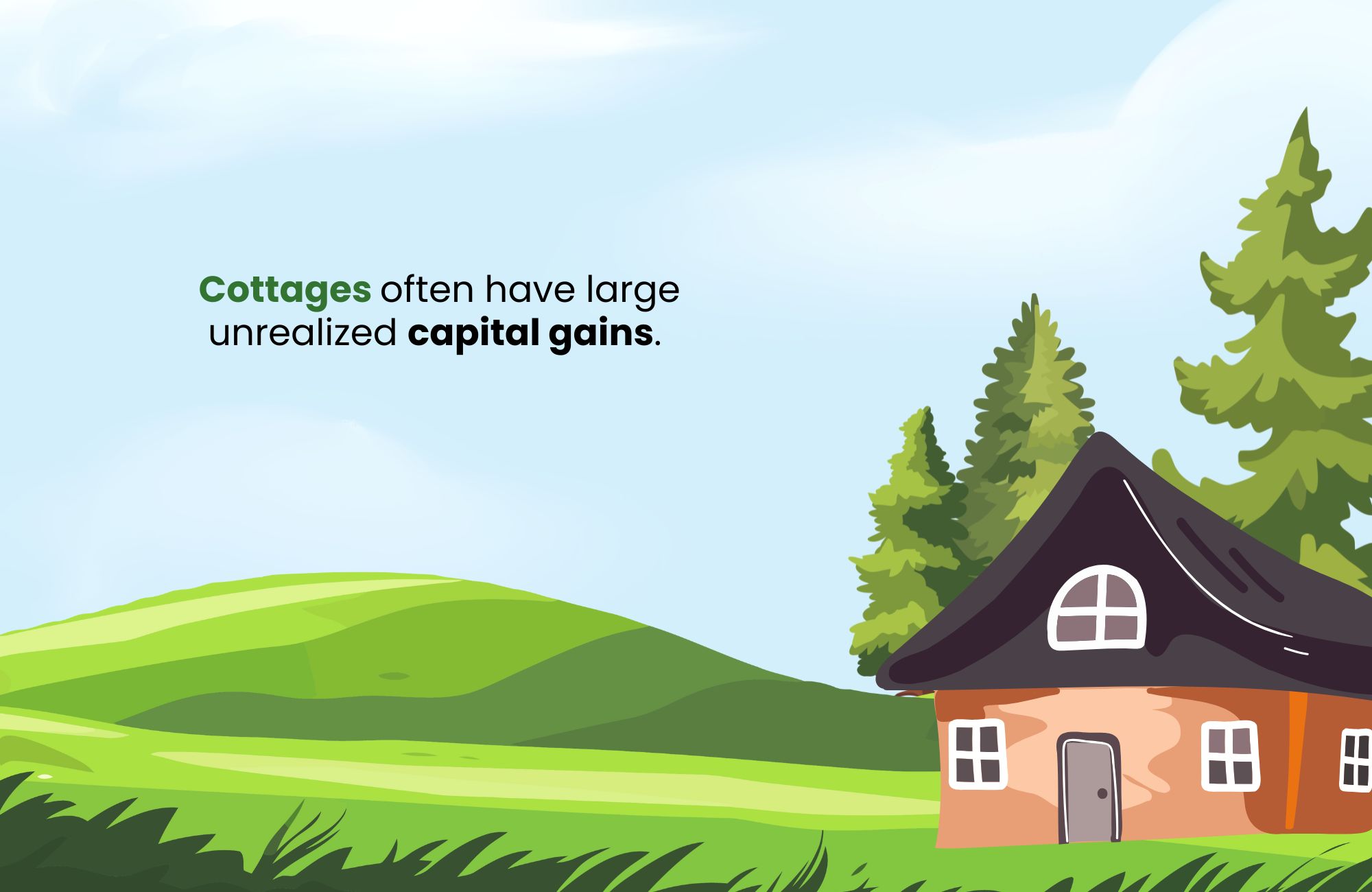
Scenario: How Estate Taxes Can Erode Family Wealth, and How to Prevent It
Meet Maria and John
Maria and John are a retired Ontario couple who have worked hard to build a comfortable life and leave a legacy for their children. Their total estate is worth approximately $5.2 million, including:
- A home in Toronto valued at $1.2 million
- Investments worth $3 million in non-registered accounts and mutual funds
- A family cottage in Muskoka, which is valued at $1 million
When John passes away, the assets transfer to Maria tax-free under Canada’s spousal rollover rules. This means there’s no immediate capital gains tax or estate administration tax on John’s passing, assuming everything passes directly to Maria.
But the real tax problem comes later.
The Tax Bill After Maria Passes
When Maria dies, there’s no surviving spouse to defer taxes to. The estate is treated as if Maria sold everything at fair market value just before her death, which is called a deemed disposition. Here’s how that plays out:
- The $3 million in investments has grown significantly in value, and that capital gain is now taxable. They have about $1,800,000 in capital gains on their investments, 50% of which is taxable. Their estate will pay tax on $900,000, which is $481,770 at a 53.53% marginal rate.
- The family cottage, which was bought decades ago for $200,000, now has $800,000 in unrealized gains, also taxable. 50% or $400,000 of the gains are taxable.
- Even the principal residence exemption only applies to one property, so either the cottage or the home may be partially taxable depending on elections made in the tax return.
In total, the capital gains tax payable could easily exceed $600,000 to $800,000, depending on cost bases and growth, significantly reducing the children’s inheritance.
The total capital gains tax owed by the estate after Maria passes will be approximately $700,000.
How can we fix this problem?
How Could Maria and John Fix This?
With the right planning, Maria and John can reduce or even eliminate much of this future tax burden. Strategies may include:
- Using permanent life insurance to offset capital gains tax at death
- Joint ownership with right of survivorship to reduce probate on select assets
- Naming beneficiaries directly on accounts and insurance policies
- Establishing an inter vivos or testamentary trust to shelter certain assets
- Electing the principal residence exemption strategically
- Gifting certain assets during their lifetime to reduce the size of the taxable estate

Common Questions about Estate Taxes in Ontario
How much is the estate tax in Ontario?
The estate administration tax, often called probate tax, is 1.5% on estates valued over $50,000, while the first $50,000 is exempt. This tax is paid by the deceased’s estate before any distribution to beneficiaries.
How can you avoid the estate tax in Ontario?
You can reduce or avoid probate tax through planning strategies such as joint ownership, proper beneficiary designation, and the use of trusts. These approaches minimize the portion of estate assets that must go through probate.
What assets are not part of an estate in Ontario?
Assets with named beneficiaries, such as registered accounts and life insurance, and jointly owned property with survivorship rights, usually do not form part of the deceased’s estate for probate purposes.
When you inherit a house, is it taxable in Ontario?
There is no inheritance tax when you receive a house, but capital gains tax may apply if it was not the principal residence. The estate owes any applicable tax before the property is transferred.
How much does an estate have to be worth to go to probate in Ontario?
Even small estates may need probate if institutions require it, but probate tax is only payable on estates valued above $50,000.
How much can you inherit without paying taxes in Canada?
There is no limit because Canada does not have an inheritance tax. Beneficiaries receive their inheritance tax-free, but the estate owes any final taxes to the CRA before assets are distributed.
Discover How to Minimize Taxes and Secure Your Legacy
Did you know that without a solid estate plan, taxes and fees in Ontario could claim a significant portion of your wealth?
If you’ve worked hard to build your business, investments, and properties, protecting your legacy for your loved ones is critical. At Strategic Wealth Protection Partners, we specialize in helping high-net-worth individuals in Ontario secure their financial futures.
Our Living Estate Plan is designed to:
- Reduce estate taxes and probate fees.
- Simplify wealth transfer to your loved ones.
- Reflect your values and priorities in every detail.
Your Legacy Matters
With our personalized guidance, we’ll help you navigate options like Living Trusts to protect your assets and ensure your family’s peace of mind. Contact us today to book your Living Estate Plan Consultation and take the first step toward a secure future.
Schedule a Living Estate Plan Consultation
Planning your legacy is about more than numbers—it’s about ensuring your family remembers you and your values are honoured for many years to come.
Estate planning and trusts can feel overwhelming, especially if it’s your first time. That’s why we’re here.
With our simple, 5-Step Living Estate Plan, we make the process easy, helping you create a comprehensive estate plan or trust that protects your assets from taxes and probate fees while preserving your legacy. Tools like The Final Word Journal capture your story, wishes, and essential details like accounts and end-of-life plans, ensuring your family has clarity and comfort.
Take the first step today—schedule a consultation call and give your family the ultimate gift: peace of mind and the assurance they were always your priority.
Read More
If you’re starting your estate planning process, you may find these articles helpful:
- Estate Planning Ontario: A Simple Guide to Getting It Right
- How to Avoid Estate Tax in Ontario
- Is Inheritance Taxable in Canada?
- What Is the Best Trust to Avoid Probate in Canada?
- How Much Is Probate Tax in Ontario?
About the Author
RON COOKE, PRESIDENT & FOUNDER OF STRATEGIC WEALTH PROTECTION PARTNERS

With over 30 years in financial services, I’ve seen the challenges families face when a loved one passes—lost assets, unnecessary taxes, and emotional stress. That’s why I created the Living Estate Plan, a comprehensive process to protect assets, eliminate estate and probate fees, and create legacies that are remembered for many years to come.
This plan ensures your family receives not just your wealth, but a meaningful reminder of your care and love. Tools like The Final Word Journal capture your story, wishes, and essential details, offering clarity and comfort during difficult times.
Your final gift should be more than money—it should be peace of mind, cherished memories, and an organized estate.
Schedule a Call
Schedule a 30-minute consultation call with Strategic Wealth Protection Partners.
Click HERE to schedule a consultation.


